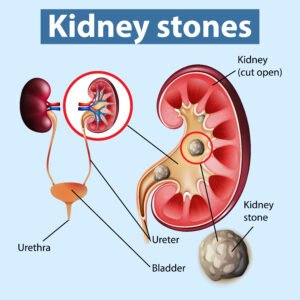Renal Stone

Renal stones, also known as kidney stones or nephrolithiasis, are hard deposits that form in the kidneys when minerals and salts crystallize and clump together.
Here’s an overview of their symptoms, causes, and treatments:
Consulting a healthcare professional, such as a urologist, is essential for accurate diagnosis and personalized treatment recommendations tailored to individual needs. By addressing underlying causes and implementing appropriate therapies, renal stones can be effectively managed, relieving symptoms and preventing complications.
Renal stones may cause the following symptoms:
Severe Pain: Intense pain in the side or back, below the ribs, that may radiate to the lower abdomen and groin. This pain, often described as sharp or stabbing, is commonly referred to as renal colic.
Painful Urination: Pain or discomfort during urination, along with urgency and frequency.
Blood in Urine: Hematuria, or blood in the urine, may occur due to irritation or damage to the urinary tract caused by passing the stone.
Nausea and Vomiting: Nausea, vomiting, and abdominal discomfort may accompany renal colic.
Urinary Tract Infections: Renal stones can increase the risk of urinary tract infections (UTIs), leading to symptoms such as fever, chills, and cloudy or foul-smelling urine.
Renal stones form when certain substances in the urine, such as calcium, oxalate, uric acid, or cystine, become concentrated and crystallize, leading to stone formation.
Factors that increase the risk of developing renal stones include:
Dehydration: Inadequate fluid intake can result in concentrated urine, making it more likely for crystals to form and precipitate into stones.
Dietary Factors: Consuming foods high in oxalate, sodium, or animal proteins, as well as low in calcium or fluids, can increase the risk of stone formation.
Genetics: A family history of renal stones may predispose individuals to develop them.
Medical Conditions: Certain medical conditions such as hyperparathyroidism, gout, urinary tract infections, or metabolic disorders can increase the risk of renal stones.
Medications: Certain medications, including diuretics, antacids, and calcium or vitamin supplements, may increase the risk of stone formation.
Treatment options for renal stones depend on the size, location, and composition of the stones, as well as the severity of symptoms:
Pain Management: Over-the-counter or prescription medications such as nonsteroidal anti-inflammatory drugs (NSAIDs) or opioids may be used to manage pain during stone passage.
Hydration: Drinking plenty of fluids, especially water, can help flush out the stones and prevent their formation.
Medications: Medications such as alpha-blockers or calcium channel blockers may be prescribed to relax the muscles in the urinary tract and facilitate stone passage.
Lithotripsy: Extracorporeal shock wave lithotripsy (ESWL) or laser lithotripsy may be used to break up larger stones into smaller fragments that can be passed more easily.
Surgical Procedures: In some cases, surgical intervention such as ureteroscopy or percutaneous nephrolithotomy (PCNL) may be necessary to remove or break up stones that cannot be passed naturally.

